中文
B-hCD73/h4-1BB mice
| Strain Name |
C57BL/6-Nt5etm1(NT5E)BcgenTnfrsf9tm1(TNFRSF9)Bcgen/Bcgen |
Common Name | B-hCD73/h4-1BB mice |
| Background | C57BL/6 | Catalog number | 111877 |
| Aliases |
NT; eN; NT5; NTE; eNT; CD73; E5NT; CALJA
|
||
模型验证
TGF-β-rich tumor milieu confers resistance to anti-4-1BB therapy by sustaining CD73 expression primarily on infiltrating CD8+ T cells
Protein expression analysis

WT mice were injected s.c. with B16-SIY melanoma cells and treated with control IgG, anti-CD73, anti-4-1BB, or both anti-CD73 and anti-4-1BB. (a) Tumor size (5 mice/group). (b) Survival curves. Percentage of CD4+ (c) or CD8+ (d) among tumor-infiltrating CD45+ T cells, and percentage of Foxp3+ (e) among total tumor-infiltrating CD4+ T cells. Ratios of CD4+Foxp3- (effectors) to CD4+Foxp3+ (Tregs) cells (f), and CD8+ to Gr1+CD11b+ MDSCs (g). Representative flow dot plots for percentage of IFN-γ+ in tumor-infiltrating CD8+ T cells (h), and the ratio of CD8+IFN-γ+ to CD4+Foxp3+ Tregs (i). (j)(k) Detection of infiltrating SIY-specific CD8+ T cells.
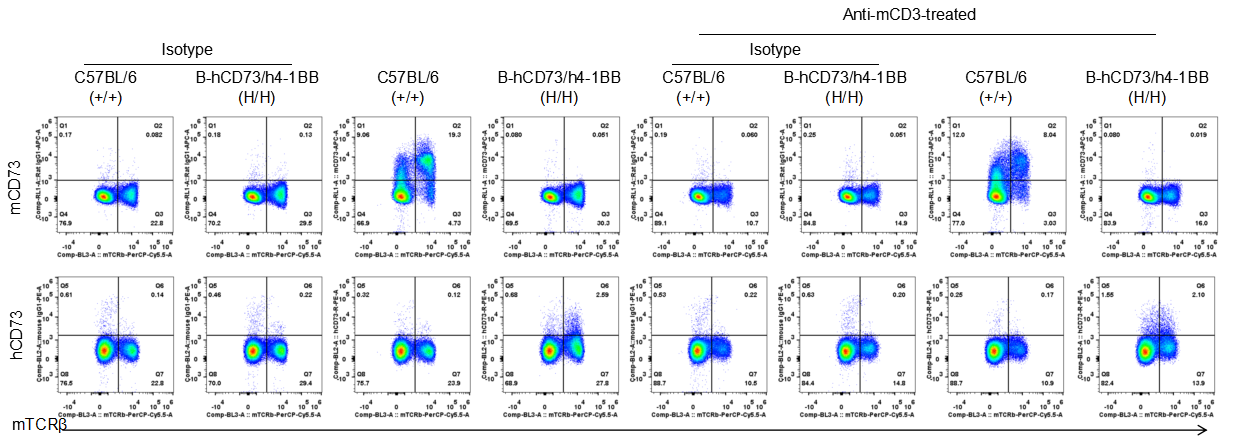
Strain specific CD73 expression analysis in wild-type C57BL/6 mice and homozygous B-hCD73/h4-1BB mice by flow cytometry. Splenocytes were collected from wild-type C57BL/6 mice and homozygous B-hCD73/h4-1BB mice, stimulated with anti-CD3ε in vivo (7.5 μg/mice for 24 hours, i.p.). Mouse CD73 was only detectable in wild-type mice. Human CD73 was only detectable in homozygous B-hCD73/h4-1BB mice.
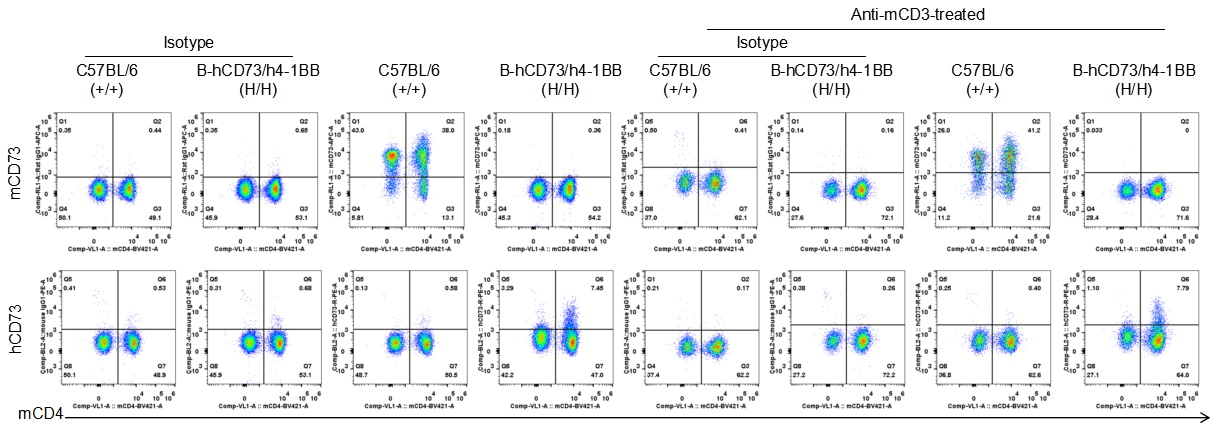
Strain specific CD73 expression analysis in wild-type C57BL/6 mice and homozygous B-hCD73/h4-1BB mice by flow cytometry. Splenocytes were collected from wild-type C57BL/6 mice and homozygous B-hCD73/h4-1BB mice, stimulated with anti-CD3ε in vivo (7.5 μg/mice for 24 hours, i.p.). Mouse CD73 was only detectable in wild-type mice. Human CD73 was only detectable in homozygous B-hCD73/h4-1BB mice.
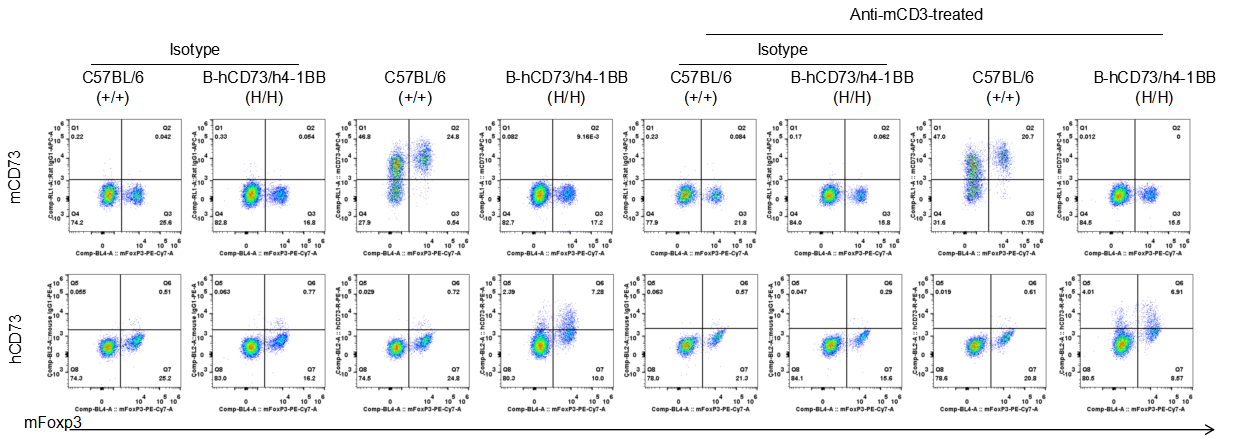
Strain specific CD73 expression analysis in wild-type C57BL/6 mice and homozygous B-hCD73/h4-1BB mice by flow cytometry. Splenocytes were collected from wild-type C57BL/6 mice and homozygous B-hCD73/h4-1BB mice, stimulated with anti-CD3ε in vivo (7.5 μg/mice for 24 hours, i.p.). Mouse CD73 was only detectable in wild-type mice. Human CD73 was only detectable in homozygous B-hCD73/h4-1BB mice.
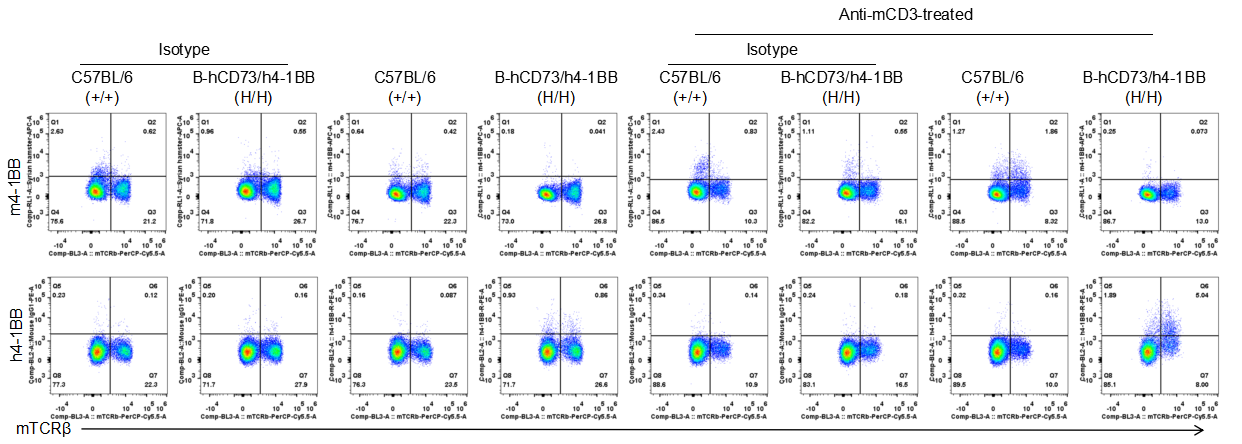
Strain specific 4-1BB expression analysis in wild-type C57BL/6 mice and homozygous B-hCD73/h4-1BB mice by flow cytometry. Splenocytes were collected from wild-type C57BL/6 mice and homozygous B-hCD73/h4-1BB mice, stimulated with anti-CD3ε in vivo (7.5 μg/mice for 24 hours, i.p.). Mouse 4-1BB was only detectable in wild-type mice. Human 4-1BB was only detectable in homozygous B-hCD73/h4-1BB mice.
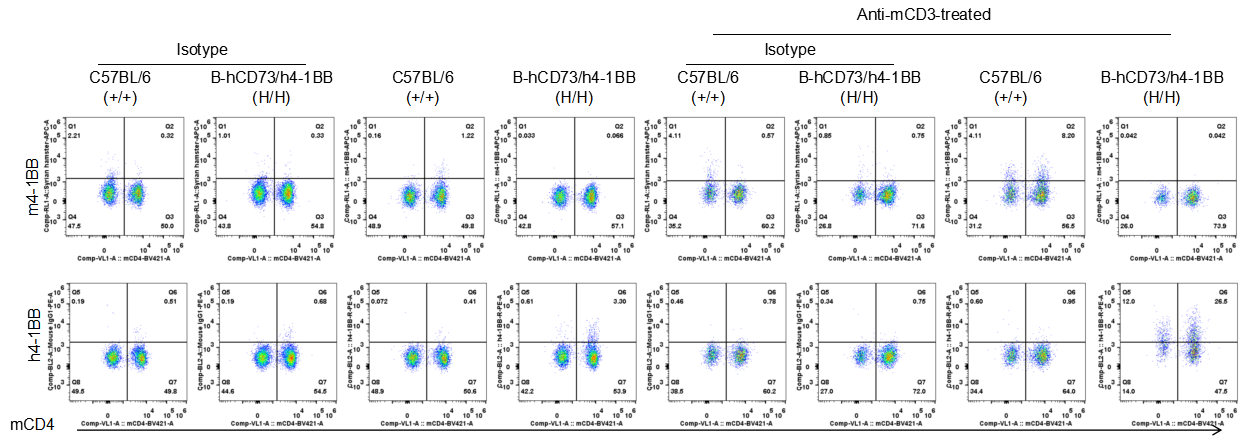
Strain specific 4-1BB expression analysis in wild-type C57BL/6 mice and homozygous B-hCD73/h4-1BB mice by flow cytometry. Splenocytes were collected from wild-type C57BL/6 mice and homozygous B-hCD73/h4-1BB mice, stimulated with anti-CD3ε in vivo (7.5 μg/mice for 24 hours, i.p.). Mouse 4-1BB was only detectable in wild-type mice. Human 4-1BB was only detectable in homozygous B-hCD73/h4-1BB mice.
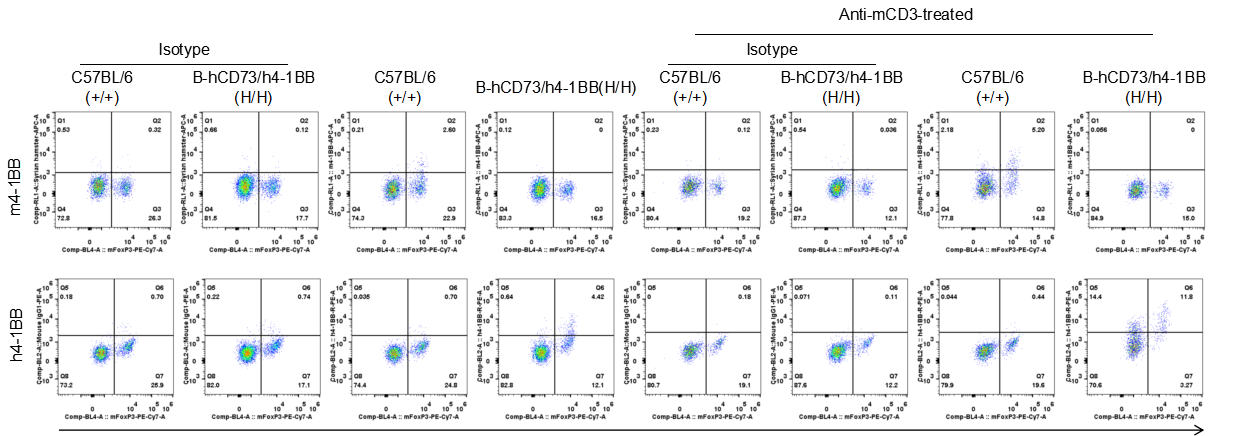
Strain specific 4-1BB expression analysis in wild-type C57BL/6 mice and homozygous B-hCD73/h4-1BB mice by flow cytometry. Splenocytes were collected from wild-type C57BL/6 mice and homozygous B-hCD73/h4-1BB mice, stimulated with anti-CD3ε in vivo (7.5 μg/mice for 24 hours, i.p.). Mouse 4-1BB was only detectable in wild-type mice. Human 4-1BB was only detectable in homozygous B-hCD73/h4-1BB mice.
Copyright © 2024 百奥赛图江苏基因生物技术有限公司. All Rights Reserved
备案号: 苏ICP备2021053911号-1
 苏公网安备:32068402320845号
网站建设:北京分形科技
苏公网安备:32068402320845号
网站建设:北京分形科技
 苏公网安备:32068402320845号
网站建设:北京分形科技
苏公网安备:32068402320845号
网站建设:北京分形科技






 010-56967680
010-56967680 info@bbctg.com.cn
info@bbctg.com.cn